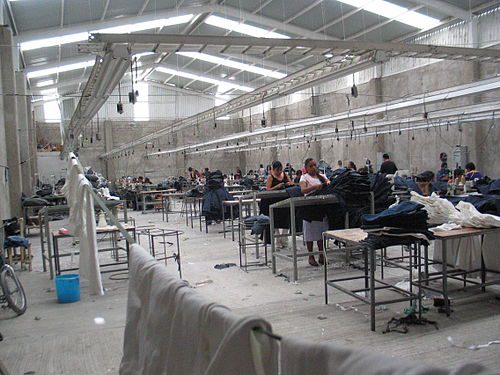The economic ties between the United States and Mexico are well over a century old, but the coverage of the border rarely contextualizes it in these terms. In order to understand the violence we see today, we must consider the violence that erupted there in the early 1990s. The film Señorita Etraviada/Missing Young Woman (2001) chronicles the mysterious deaths of hundreds of women in Ciudad Juárez starting two decades ago. Filmmaker Lourdes Portillo challenges us to look beyond our assumptions about Mexican culture and biases about working-class women to recognize an epidemic of violence costing Mexico a generation. Portillo finds the maquiladoras, the factories on the border that manufacture products largely for American consumption and largely profiting American corporations, at the middle of the chaos that allowed the murders of these women.
Alejandro Lugo’s book, Fragmented Lives, Assembled Parts: Culture, Capitalism and Conquest at the U.S. Mexico Border, considers the historical legacy of the twin cities of Ciudad Juárez and El Paso, Texas. Lugo suggests that the placement of Juárez, at the intersection of the Iberian Century and the American Century, brings together global capitalism and imperial conquest in a way that reduces the human element – the maquiladora workers – to a cog in a global machine. To explore the historical legacy of the borderlands even futher, consider Intepreting Spanish Colonialism: Empires, Nations and Legends, edited by Christopher Schmidt-Nowara and John M. Nieto-Phillips. This collection of essays examines nation-building and historiographies in the nineteenth and twentieth centuries, centering on the narratives of Spain and its colonies as backward in comparison to the narratives of progress associated with Great Britain and its colonies. These historical legacies have stuck, in great measure, and they intersect in the U.S.-Mexico borderlands.
 Vicky Funari and Sergio de la Torre present a different view of the maquiladoras in their documentary, Maquilapolis (2007). In a colonia on the edge of Tijuana, women maquiladora workers organize to fight for severance pay, safe working conditions, and to clean up of the toxic waste polluting their community. American business interests and Mexican government officials insist their workers have good lives, but we see otherwise in the tours the women give us of their communities. (Watch the trailer here.)
Vicky Funari and Sergio de la Torre present a different view of the maquiladoras in their documentary, Maquilapolis (2007). In a colonia on the edge of Tijuana, women maquiladora workers organize to fight for severance pay, safe working conditions, and to clean up of the toxic waste polluting their community. American business interests and Mexican government officials insist their workers have good lives, but we see otherwise in the tours the women give us of their communities. (Watch the trailer here.)
There are examples of productive cross-border alliances as well. The photographer David Bacon documents many of the efforts to build solidarity across the border, including the deep roots of many non-governmental organizations. There are also corporate projects that change the relationship between U.S. and Mexican partners. For example, PepsiCo has undertaken a new initiative that saves the corporation money, but also benefits small corn and sunflower farmers in Mexico. The elimination of middlemen and strategic use of regional production facilities, helps both the corporation and the farmers. Such projects, while still profit-oriented, can enhance communities in Mexico and reduce migration to the United States.
For more reading and viewing, take a look at Anne Martínez’s “Rethinking Borders” in DISCOVER.
Photo Credit:
Guldhammer, A Maquiladora factory in Mexico, via Wikimedia Commons



